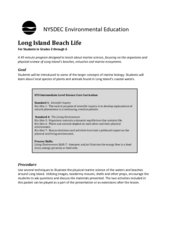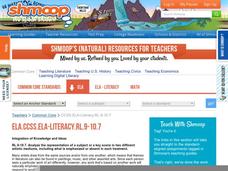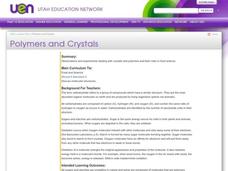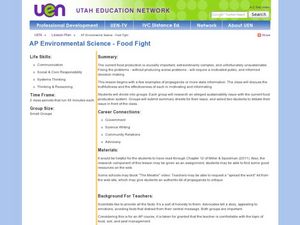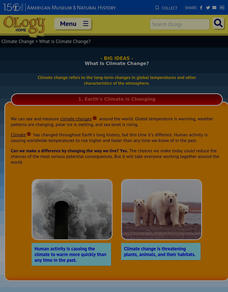Curated OER
The Chemistry of Refining Crude Oil
Consider our energy sources: wood, coal, oil, uranium. Learners compare the pollution to energy produced for each. They practice fractional distillation of an alcohol/water mixture to simulate the process of refining crude oil....
Curated OER
Solar Sweet Tea
Students study the sun. In this heat energy lesson, students use the sun's warmth to make tea. They place a few jars with tea bags and water in the sun and discuss what the sun is doing to the water while they wait for the tea to brew....
Curated OER
Long Island Beach Life
Have your class learn about marine life through this resource. This comprehensive lesson has learners discuss marine life, learn key vocabulary, discuss environmental concerns, and play games related to migration and predator/prey...
Science Matters
Ring of Fire
Over a period of 35 years, earthquakes and volcanoes combined only accounted for 1.5 percent of the deaths from natural disasters in the United States. The 15th lesson in a 20-part series connects the locations of earthquakes and...
American Museum of Natural History
Ask a Scientist About Our Environment
Let's ask an expert! Scientists at the American Museum of Natural History field questions about the environment in an interactive resource. Question topics range from global warming and conservation to endangered species and habitats.
Curated OER
Ocean Life
Mini-marine biologists use Scholastic Explorers website to learn about declining numbers of leatherback sea turtles and dusky dolphins. They fill out a K-W-L chart and observation journal worksheet, which are both provided in the lesson...
Shmoop
ELA.CCSS.ELA-Literacy.RL.9-10.7
Use this resource's pairings of classical literature and paintings to practice the skill of comparing different artistic mediums with your ELA class. Addressing standard 7 for literature in the Common Core, the resource encourages your...
Curated OER
Polymers and Crystals: Their Role in Food Science
Blend chemistry with cooking in this exploration of polymers, carbohydrates, and food science. Experimenting with gelatin produces concrete examples of the bonding and ploymerization discussed in the lesson. Copious, comprehensive...
Texas State Energy Conservation Office
Global Climate Change
Here is an extensive reading resource that addresses our climate change crisis. It thoroughly explains the greenhouse effect, related Earth cycles, and the history of climate change. Use it as part of the intended unit, published by the...
Curated OER
Waves: Sound and Light
A few definitions related to waves open this slide show. Note that the information only covers light waves even though the title mentions sound. Correct the title before using this resource. Another mention is a set of photos of a class...
Curated OER
AP Environmental Science-Food Fight
The content in this lesson is of a controversial nature. Please review to make sure it is suitable for your class. A video, The Meatrix is shown to the class, and then they discuss the emotionally-charged language that it uses. They are...
Hawaiʻi State Department of Education
Mask Symmetry
When you engage learners in creating symmetrical objects you are also building their vocabulary and math sense. Kids discuss key words such as, asymmetrical, symmetrical, balance, tint, and shade. They use these elements of design to...
American Museum of Natural History
What Is Climate Change?
So many factors show that climate change has arrived. Learners read through an online resource that explains the data and the consequences of climate change. They also review strategies for slowing or even reversing the global influence.
Curated OER
Who Lives In The Water
Students investigate the environment of a stream or lake to collect and observe macroinvertebrates in their natural environment. They record data and summarize the information obtained. Students look to see if there has been any human...
Curated OER
Commonalities and Differences from Africa to Cleveland as Evidence Through the Gullah Community Connection
Young scholars explore Afro-American history. They identify the commonality between African, Carolinian and Cleveland Black culture. Students explore the water cycle, oceanography, hydrology and bio-geochemical processes. They discuss...
Curated OER
Don't Trust Your Eyes
Students brainstorm a list of possible actions that they could do to protect the water resources from pollution. They create hypotheses and conclusions by completing experiments and observing different pollutants.
Curated OER
Water, Water Everywhere
Studetns view a terrarium with water droplets on the wals. They discuss the ways the water could have got onto the wall of the terrarium. Students design an experiment to duplicate the process. They describe the patterns form their data...
Curated OER
On the Surface
Learners draw and label the 15 major rivers in Texas. They then draw and label another map with the major lakes and reservioirs of Texas. Students use the maps and locate and label the location of the following major Texas cities:...
Curated OER
But They Never Told Me!
Young scholars investigate how government legislates the protection of citizens from natural disasters such as earthquakes in California. They read the Alquist-Priolo Special Studies Act and debate its pros and cons. They discuss how...
Curated OER
Cleansing, Sparkling Koos
Students explore the importance of water conservation and investigate how plants clean water.
Curated OER
Habitats and Components School Forest Lesson Plan
Second graders go on nature scavenger hunts. In this nature scavenger hunt lesson, 2nd graders explore the natural habitat of their school grounds and make observations regarding the objects and animals they find in the air, on the...
Curated OER
Reading and Writing Poetry: Seeing Many Facets of Fresh Water
Students create an original poem about water. In this Robert Frost and water lesson, students read examples of Robert Frost's poetry, write an interpretation, and look for imagery that appeals to the senses. Students use a...
Curated OER
Lesson Six
Students investigate the importance of ocean resources and what humans need to do to maintain a healthy ocean. In this oceans lesson students participate in an activity after viewing a PowerPoint presentation on the Earth's...
Curated OER
Wwf Activity on Exploring Feelings
Young scholars explore feeling about the natural world and how those feelings are being affected by human action. They write poetry after viewing images of swallows in action and listening to poetry about the birds.




